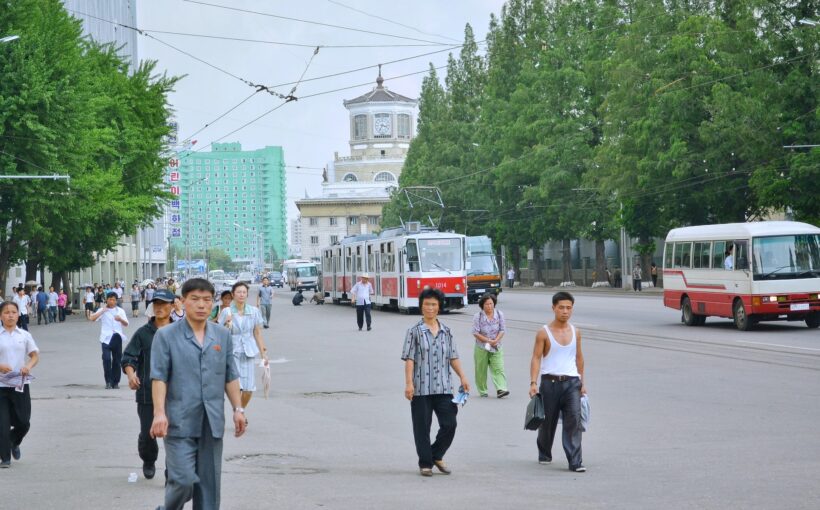
Consuming and sharing foreign media in North Korea can be punishable by death. But that did not stop more than 83% of those who escaped the country between 2016 and 2020 using increasingly sophisticated means to access foreign music, TV shows and films before they left.
According to a survey report that was released by the South Korean Ministry of Unification, illegal media consumption among those who left in the five years up to 2020 increased by 15% compared with the previous five-year period.
Since the mid-1990s, over 34,000 North Koreans have defected to South Korea. However, North Korea closed its borders during the COVID pandemic, and since then the steady flow of escapees has slowed considerably.
The number of informants has dropped and the information they bring may be somewhat dated by the time they reach the South. But many tell a common story of huddling around a TV or laptop behind locked doors, consuming foreign media that was smuggled into North Korea on USB sticks and SD cards.
Escapees also tell how knowledge of the outside has changed North Korean consumer behaviour, relationships and trust in the Kim family’s regime. This has prompted North Korea’s leader, Kim Jong-un, to adopt increasingly harsh measures to combat access to illegal media.
Crackdown
Research that I conducted with my colleagues in 2019 while working for a human rights documentation NGO in South Korea found that public execution had been used by the North Korean state against people convicted of consuming or disseminating foreign media. The BBC reported one such case having recently taken place.
Forcing friends and neighbours to witness the punishment of those known to them for such a crime is a powerful deterrent deployed by a state that considers outside knowledge a profound threat to its ideology and the control of its people.
Shortly after inheriting the leadership in 2011, Kim tried a number of relatively soft approaches to controlling foreign media access, alongside continued punitive measures. They included a suite of information strategies aimed at making North Korea appear competitive and attractive in the eyes of its citizens, capable of producing its own “popular” content to rival the mighty force of the (South) “Korean Wave”.
More recently, the North Korean government has capitalised on its border closure to work harder than ever to keep foreign information out of the country. In 2020, it introduced a new “Law on the Elimination of Reactionary Thought and Culture”. This law sets out specific punishments for both viewers and distributors of foreign media, going further than the existing criminal code.
At the same time, Kim has publicly condemned K-Pop (pop music originating in South Korea) as a “vicious cancer” permeating North Korean society.
Changing hearts and minds
Testimonies published by organisations working with North Korean escapees show that consumption of South Korean television dramas has inspired young North Koreans to copy the fashion choices and catchphrases popularised by key characters.
North Korean escapees have also reported paying keen attention to the settings they saw in films and dramas. Modern streets, cars and homes, with people displaying relative freedom of choice, expression and movement, all offer North Koreans a glimpse into life under capitalism.
These depictions profoundly contradict the state’s narrative. North Korea presents the South as a depraved hellhole where people are ideologically corrupt and languishing in poverty.
A recent video from North Korea shown to me by the Korea Institute for National Unification shows that the new law on foreign media and culture is being accompanied by television campaigns. These campaigns harshly name and shame citizens seen wearing clothing in foreign styles, particularly with English language writing or slogans – the language of the “American bastards”.
A similar campaign condemns young North Koreans for showing affection in public and mimicking “western style” dating culture. Such behaviour is criticised as corrupt and destructive to North Korean societal purity.
Building social bonds
Consuming foreign media does more than just cause North Koreans to question their government’s claim that they live in an “ideal” society, striving to attain a socialist utopia. It also unsettles the government’s ability to maintain a culture of suspicion and mistrust between citizens. This could potentially generate social change.
When asked about his experience watching foreign media with friends and family before his escape, one North Korean man said: “If you’ve watched it together, then no one would report it. They’d go down for it too.” For some North Koreans, consuming foreign media is an activity that builds closeness through shared indulgence in an illegal act.

Foreign diplomats, humanitarian aid workers and tourists are not yet allowed back into North Korea following the pandemic. So, combined with many fewer escapees arriving in the South, it is difficult to know whether foreign media access and consumption has declined since 2020.
But the Ministry of Unification has pledged to offer an update in a year’s time to evaluate the effect of the new law against foreign culture and the campaign around it.
![]()
Sarah A. Son does not work for, consult, own shares in or receive funding from any company or organisation that would benefit from this article, and has disclosed no relevant affiliations beyond their academic appointment.



